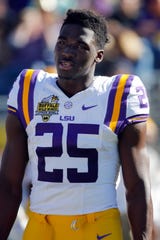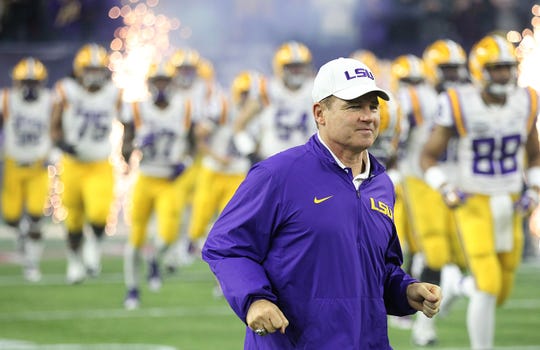Two LSU employees had troubling records. Many ask why they’re not fired.
Two University of Kansas employees lost their jobs this week in connection with sexual misconduct allegations at a campus 800 miles and three states away. Meanwhile, many in Louisiana wonder when they’ll see such accountability from their state’s own flagship university.
Louisiana State University on Friday released a report detailing a years-long, systemic failure to properly report and investigate allegations of sexual misconduct at the school. It has fired no one for their roles in the scandal.
Instead, it chose to suspend two people.
Verge Ausberry and Miriam Segar, longtime and high-ranking athletic department administrators with extensive, documented histories of skirting the school’s sexual misconduct policies by keeping allegations against athletes in house, were placed on unpaid suspension.
Both will be back at their jobs by early next month.
Verge Ausberry, LSU Executive Deputy Athletics Director / Executive Director of External Relations (Photo: Steve Franz/ LSU Athletics)
Meanwhile, Kansas on Monday parted ways with head football coach Les Miles, who during his time at LSU was found to have made sexual advances on female student employees and demanded “blondes with the big boobs” and “pretty girls” to work in his office, according to two internal investigations done at the request of LSU.
Two days later, Kansas split with its athletic director, Jeff Long, who said he didn’t know about the allegations at LSU when he hired Miles in 2018.
While the revelations of “significant alleged misconduct” by Miles from 2009 until he was fired from LSU in 2016 have grabbed the most attention, the report detailed multiple instances where Ausberry, the executive deputy athletic director, and Segar, a senior associate athletic director, mishandled sexual misconduct complaints. Ausberry is mentioned 72 times in the 148-page document, Segar 194.
At a minimum, the two failed to follow proper procedures, investigators at Husch Blackwell found. At worst, they put women directly in harm’s way by failing to share sexual misconduct and violence allegations with the university’s Title IX Office
Husch Blackwell is the outside law firm hired by LSU to investigate the school after USA TODAY uncovered widespread problems in November.
Miriam Segar, LSU Senior Associate Athletics Director / Senior Woman Administrator (Photo: LSU Athletics)
“We believe the University should consider appropriate discipline for Ausberry,” Husch Blackwell wrote in a footnote to one case, saying his inaction “could have led to catastrophic consequences.”
Segar’s failure to document a rape allegation against former LSU star running back Derrius Guice was a critical error, according to Husch Blackwell.
“Because of this omission,” the firm wrote, “when Guice was accused of subsequent misconduct by other students…, this initial report was not considered or revisited.”
Interim LSU president Thomas Galligan defended his decisions on Ausberry and Segar, saying the two “were put in positions that were impossible for them. The confusion was absolutely rampant. When I looked at the training, the policies, it wasn’t clear. The employees didn’t understand what their obligation was.”
He said he felt “conflicted” about his decision, but that he felt an equal obligation to be “fair to everyone involved.”
That has not been enough to quiet the outrage.
At the same time that Kansas announced Long’s departure Wednesday, a group of Louisiana state lawmakers and former and current LSU students who survived sexual abuse on campus were testifying during a hearing at the state Capitol. They railed against what they called light punishments. Some called the suspensions of Ausberry and Segar a “slap in the face” to victims. Others called it “a direct insult.”
The Louisiana Legislature’s Select Committee on Women and Children adopted a formal letter calling LSU’s response to the investigative report by outside law firm Husch Blackwell “tone deaf” and demanded accountability.
LSU President Tom Galligan testifies before the Senate Select Committee on Women and Children at the Louisiana State Capitol in Baton Rouge, LA. Wednesday, March 10, 2021. (Photo: Scott Clause, USA TODAY Network)
“In order to restore trust, there must be consequences,” the letter said. “The committee hereby requests that the university reconsider the punishment meted out and take action to terminate the employees it holds responsible for mishandling the reports of sexual abuse and to continue to identify and properly discipline any other culpable individual.”
Among Husch Blackwell’s findings on Ausberry and Segar:
On April 14, 2018, Ausberry received a text from then-LSU wide receiver Drake Davis saying that he had hit his girlfriend. “She started to hit me. And I hit her in the stomach.(which is not good) and I walked out.”
According to Husch Blackwell, rather than reporting the incident to the Title IX Office, Ausberry’s phone records show that he spoke with Davis for six minutes. Ausberry told The (Baton Rouge) Advocate that Davis had told him that he did not hit Lewis.
Husch Blackwell notes that Ausberry’s excuse “is not credible as Davis explicitly says in the text exchange that ‘I hit her in the stomach’ and acknowledges this ‘is not good.””
LSU Tigers wide receiver Drake Davis (25) prior to the game at Camping World Stadium on Dec. 31, 2016. (Photo: Kim Klement, USA TODAY Sports)
No other LSU official knew about Davis punching Lewis until nearly two weeks later, when she met with an athletic trainer. According to the Title IX report filed that day, Lewis needed help with her ribs which were “very swollen,” and she was struggling to sleep because she was in so much pain from the injury.
“We emphasize that had Ausberry reported Davis’ text message to the Title IX Office or the police when he received it, Lewis could have received more timely medical care,” Husch Blackwell states in the report.
Investigators did note that Ausberry’s failings in this case were due, in part, to “a clear lack of leadership in providing clarity about institutional reporting obligations.”
Davis pleaded guilty in 2019 to two counts of battery against Jade Lewis.
Sometime in 2015 or 2016, a female student employee who considered Ausberry a “mentor” began babysitting for him in his home.
This was in violation of the “Athletics and Football Operations Policies and Procedures in place at the time” barring employees from hiring student workers for personal jobs, Husch Blackwell found.
Ausberry’s hire of the student also came after Miles was told to stop hiring student employees to babysit following a 2013 investigation into his questionable behavior with students.
Ausberry was the subject of a Title IX complaint by football recruiting director Sharon Lewis. Lewis accused Ausberry of screaming at her, calling her profanities, and doing “other acts of harassment.”
Husch Blackwell says that other Football Operations employees confirm Ausberry hollering and screaming at Lewis repeatedly.
Sharon Lewis, LSU Associate Athletics Director/Football Recruiting and Alumni Relations (Photo: Chris Parent, Chris Parent / LSU Athletics)
According to Husch Blackwell, this was reported to a Deputy Title IX Coordinator but no one investigated. Ausberry denied these accounts, saying his relationship with Lewis was one of “brother-sister” and “lovehate.”
He told Husch Blackwell that Segar simply instructed him to “just leave [Sharon] alone.”
In early 2013, Segar received a report from Sharon Lewis about a student worker who was “very upset about something that happened when she was alone with Coach Miles.”
Lewis also said that she and another employee accompanied the student as she confronted Miles and that the student was “completely traumatized” by the alleged incident.
It’s unclear what happened after Segar received this information. Husch Blackwell said it could find no record of this student’s concern being investigated “in a manner consistent with then-University policy” and that there also were no records or other evidence of the student “being provided with notice of her rights and options in response to the complaint, or perhaps more importantly, any supportive resources.”
Lewis told the Husch Blackwell investigators that Segar recommended the student “be moved out of the building” and that she could “no longer work in football.”
Miles coaching LSU in 2015. (Photo: Thomas Shea, USA TODAY Sports)
Segar told investigators that the student “had already addressed it directly with the coach” and communicated to Segar that she “did not want to do anything about it.”
Shortly afterward, Segar was told by Lewis about another complaint from a female student worker against Miles.
This student alleged Miles tried to kiss her. Instead of reporting this information to the Title IX Office, Segar and then-athletics director Joe Alleva reported it to the university’s outside law firm, Taylor Porter, investigators found.
In addition, Lewis told Segar she was not “super comfortable” around Miles and “did not have a good relationship with the coach because he “knew that she was aware of the allegations against him.” Segar assured Lewis her job was safe and suggested she get counseling.
Segar confirmed to Husch Blackwell that “she did not report any of these complaints to the Title IX Office or to Human Resources for resolution.” Husch Blackwell says “this was an error.”
Though Segar made a Title IX report after an LSU Swimming and Diving coach said in early 2016 that she had heard a student had been assaulted by Guice, Segar omitted Guice’s name from that report.
She told Husch Blackwell she “didn’t want to put it in writing” because “I got a lot of public information requests” and “didn’t think it was super secure.”
Derrius Guice, who played at LSU from 2015 to '17, has been accused of rape by two former students. (Photo: Wesley Hitt, Getty Images)
The absence of Guice’s name was a critical error, according to Husch Blackwell, in light of subsequent complaints about him.
“None of these accusations of misconduct were investigated by the University and Guice was never disciplined for any of these reports,” Husch Blackwell wrote.
Segar failed to alert Title IX to a December 2017 complaint from a 70-year-old woman who worked security at the Superdome and said Guice had aggressively sexually harassed her, including gesturing at his crotch and grabbing himself.
Segar told Husch Blackwell that the athletics department did its own investigation, which Husch Blackwell characterized as two simple encounters – “they spoke to [Guice] and he denied this occurred” and “they also spoke to [a fellow football player] who was identified as being present and [he] shared that this did not occur.”
A Title IX investigator’s interview with then-LSU tennis player Jade Lewis, whose abuse by Drake Davis had been well-documented, was delayed because the scheduling of it, for a reason unknown to Husch Blackwell, had to go through Segar.
Segar texted Davis after he was arrested on Aug. 17, 2018, on domestic violence charges, offering to assist “Davis with his student conduct matter involving Lewis.” She wrote, “Need to work on your statement to include personal circumstances/issues. When can you come by? Add that to your statement.”
After Davis’ arrest, another LSU student, Calise Richardson, told Ausberry she, too, had been abused by the wide receiver. Ausberry told Richardson to talk to Segar. A few days later, Richardson said she got a voicemail from Segar.
“I immediately called her back and I never heard from her again,” Richardson told USA Today in December. “Never called me back, never emailed me, nothing.”
Source: Read Full Article



